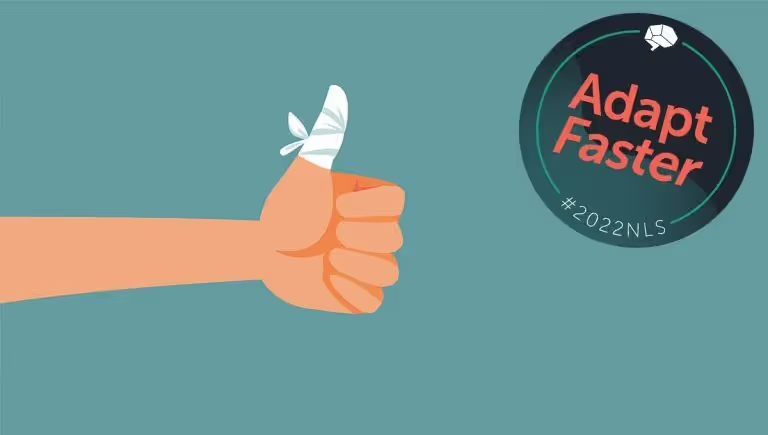We know it’s been a traumatic two years. We’re exhausted and quitting in record numbers. We’re eager to find purpose and be excited about work and life again. And even though we know the performance benefits of things like managing cognitive capacity and getting enough downtime, we sometimes still struggle. Simply put, it can be hard to find strength and motivation to keep grinding away when everyone is in survival mode.
But every now and then you find someone who understands the science of resilience from both an academic perspective, and from personal experience. That’s why we decided to talk to Dr. Noël Lipana. He’s spent the latter half of his academic career in social work helping define and find treatments for moral injury–an affliction that the Department of Veterans Affairs describes as a traumatic injury resulting from witnessing, perpetuating, or failing to prevent an action that goes against an individual’s expectations or deeply held beliefs. He now helps prevent targeted violence in communities in his role as a Regional Prevention Coordinator at the Center for Prevention Programs and Partnerships, U.S. Department of Homeland Security, and as a former Air Force Lieutenant Colonel and combat veteran, he’s got personal experience with the effects—and misdiagnosis—of moral injury, too. We asked him some questions about moral injury and why it matters to organizations. Below are edited excerpts.
You study moral injury and moral trauma. What is that, and how is it different from post traumatic stress?
Post traumatic stress is a medical condition. Moral injury is a condition that thought leaders in the space believe is a humanistic affliction. It shares attributes with post-traumatic stress that mimic or present the symptom clusters of hyper vigilance, re-experiencing, avoidance, altered cognition and mood. Aside from that, the outlying attributes are unresolved guilt, loss, shame, an altered sense of identity, and isolation–which is, from my own lived experience–different from avoidance, and that nuance to me is important because it will screen as avoidance but in fact it’s a different kind of isolation. Alienation might be a better descriptor.
Would two different people experiencing the same event present different symptoms?
Two people can experience the same type of trauma–the same moral conflict –and present symptoms differently because of a difference in what [some] would call a moral architecture. Everyone’s foundations are different in terms of their composition and how those elements in their architecture are developed. So, for instance, if you’re raised in a religious household and are adhering to religious practices, whether you’re authentically attached or going along with those practices will make a difference. Your school, teachers, how your sense of right and wrong is developed – that’s all going to play into how you evaluate an event and your behavior in response.
So essentially it’s an attack on your belief system, based on your expectations of fair treatment or moral justice, and that’s what triggers your injury or trauma?
There’s what [researchers believe to be four] attributes or abilities that precede a moral injury. They don’t all have to be present, but…you have to have the ability to empathize, you have to be able to create a memory narrative, you have to understand moral reasoning, and the ability to evaluate behavior. And that’s tied closely to the three big assumptions that Judith Herman, M.D, and Ronnie Janoff-Bulman tell us that get shattered in moral injury or trauma itself and that is that the world is a safe place, other people are good, and I’m a good person.
Are there certain people who are more at risk for moral injury?
My experience in the military and frequent group work reveals that there are certain individuals you can count on being in those groups and dealing with this affliction – medical professionals and elite military professionals, or fields that typically attract a certain type of person who wants to do good. The military is one of the many professions guilty of moral perfectionism, the expectation that zero defects in our policies and procedures will always lead to a good outcome. So, you see medics keep working on people that can’t be revived but they just don’t quit and it’s because they have this deep sense, that repetition built into their head, that if they just hang in a little longer, if they just problem solve this, if they just make the right decisions then they’ll eventually get a good outcome and they just don’t quit. So they struggle with reconciling [when they lose people] because it doesn’t match their expectation.
Sounds like there is potential for accumulated, collective moral injury in many workplaces because if you expect fair treatment and then watch coworkers be subject to microaggressions that could trigger moral injury if that goes against your belief system?
Yes, and if it wasn’t against you, or it was from the past, there could even be a delayed onset once you gain a more mature sense of fairness. And hopefully accompanying that is this sense of obligation or participation in righting unfair practices. So if you have an employee that’s pretty far down in the organization and you’re witnessing someone being mistreated by someone several levels above them, and that disempowerment, that sense of helplessness [that you didn’t speak up] is a huge contributor to moral injury or moral trauma.
Does that, then, impact our motivation and our intrinsic desire to do the work?
Absolutely. If you sense that you don’t have this shared sense of fairness with the place you’re helping generate revenue for, and you’re thinking, ‘I’m part of an organization whose vision and mission statement is filled with inclusive language, and yet we also tolerate or create a culture that allows for microaggressions or unfair practices or that propagate systemic or implicit bias,’ you’re wondering why am I contributing to this? And now I’m torn as an individual between these two loyalties – to my individual sense of right and wrong and justice and wanting to share either in suffering or right these injustices, and this loyalty to this organization that happens to pay my bills.
To hear more from Noel, tune into NLI’s 2022 Summit, February 15-16





.avif)


